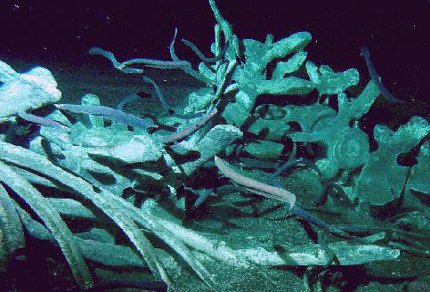Whale Poop Pumps Up Ocean Health
New research in the Southern Ocean has revealed that the excretion of nutrient-rich poo from whales boosts the growth of plankton in the ocean, which helps to remove carbon dioxide from the atmosphere. The increased population of plankton bolsters the removal of carbon dioxide from the atmosphere.
University of Vermont whale biologist, Joe Roman and his colleague James McCarthy from Harvard University have discovered that most whales actually deposit waste that floats at the surface of the ocean as a "very liquidy, a flocculent plume."
Image: Humpback whale poop
Source: courtesy of Jennifer Kennedy at About.com Marine Life
Whale poop doesn't sink to the bottom of the ocean. The Harvard studies have shown that whales play an important role in transporting nutrients from where they feed, in deep waters, up to the surface, where they fertilize tiny, floating plants called phytoplankton.
Research in the Southern Ocean has revealed that the excretion of nutrient-rich poop from whales boosts the growth of plankton in the ocean, and this bolsters the removal of carbon dioxide from the atmosphere.
Australian biologists estimated that 12,000 sperm whales in the Southern Ocean each defecate about 50 tonnes of iron into the sea every year after digesting the fish and squid they hunt.
The iron is a terrific food for phytoplankton - marine plants that live near the ocean surface and which suck up carbon dioxide from the atmosphere through photosynthesis.
The ability of the Southern Ocean to act as a carbon sink may have been diminished by large-scale removal of sperm whales during industrial whaling.
Clearly, it is erroneous to claim, as the three whaling countries tout, that whales compete with their commercial fisheries. Rather, they enhance them.
Whale Fall
Living whales can provide as much, if not more, valuable scientific information to aid their conservation than dead ones. Even dead on the ocean floor ("whale fall"), their bodies support a myriad of marine species for decades.

Image: whale fall Wikimedia commons.
Oceanographer Craig Smith of the University of Hawaii has been studying the remarkable afterlife of whale corpses ("whale fall") and has shown that their remains last for decades and must dot the ocean bottom everywhere as they are natural stepping stones between hot vents and cold seeps, supporting a myriad of species.
A San Diego biotechnology company is working with Smith to develop a cold-water detergent containing an enzyme found in bacteria growing on whale bones. Such a detergent may have the potential to yield substantial energy savings on a national scale. Understanding what happens to organic-rich matter in the deep sea--like a 35 ton whale--is another area of broad ecological interest.
Some scientists say the self-awareness, suffering and a social culture, along with high mental abilities, are a hallmark of cetaceans. There are so many values associated with whales and dolphins that it is criminal to reduce their value to that of livestock, or simply "meat"!
If Japan is justifying their illegal whale slaughter under the smoke-screen of "scientific research", then their junk science must be exposed to enforce their removal.

Comments
nimby (not verified)
Tue, 2010-12-28 18:57
Permalink
Hardly fertile like a "plague" of cockroaches
nimby
Sat, 2011-01-01 15:14
Permalink
Sea Shepherd tracks down the whaling fleet
Bandicoot
Fri, 2011-01-07 09:55
Permalink
Why is Japan allowed to bully us?
nimby
Fri, 2011-02-18 19:24
Permalink
Sea Shepherd have "suspended" Japan's bogus whale "research"!
nimby
Tue, 2011-03-08 10:07
Permalink
Our AFP are now agents for Tokyo police
Add comment